Unit 8 Have you read Treasure Island yet? 现在完成时考点 课件(共26张PPT,无音频)
文档属性
| 名称 | Unit 8 Have you read Treasure Island yet? 现在完成时考点 课件(共26张PPT,无音频) |  | |
| 格式 | zip | ||
| 文件大小 | 1.8MB | ||
| 资源类型 | 教案 | ||
| 版本资源 | 人教新目标(Go for it)版 | ||
| 科目 | 英语 | ||
| 更新时间 | 2020-06-16 21:08:40 | ||
图片预览


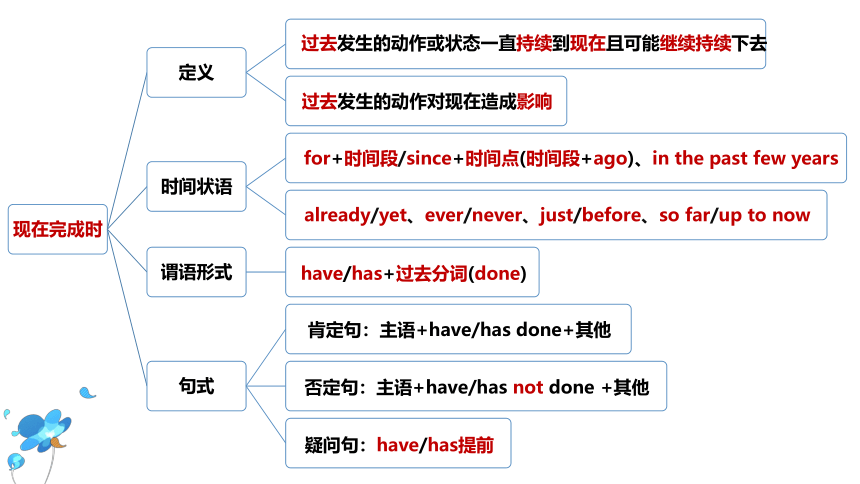
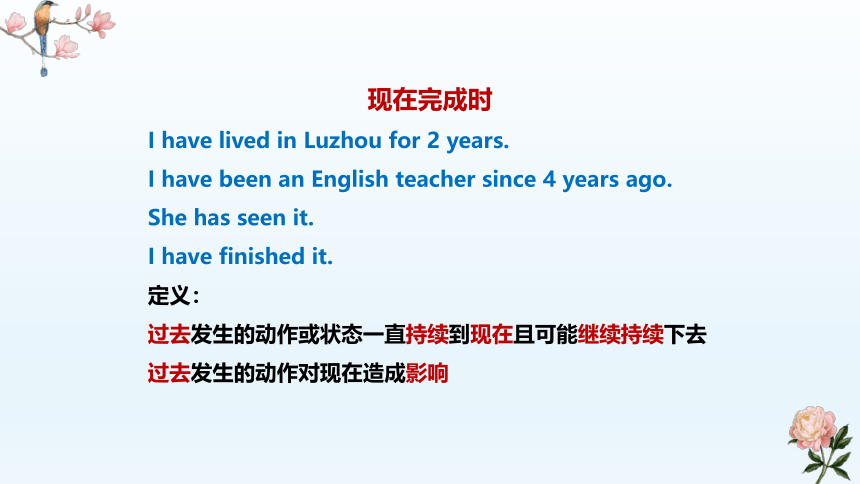
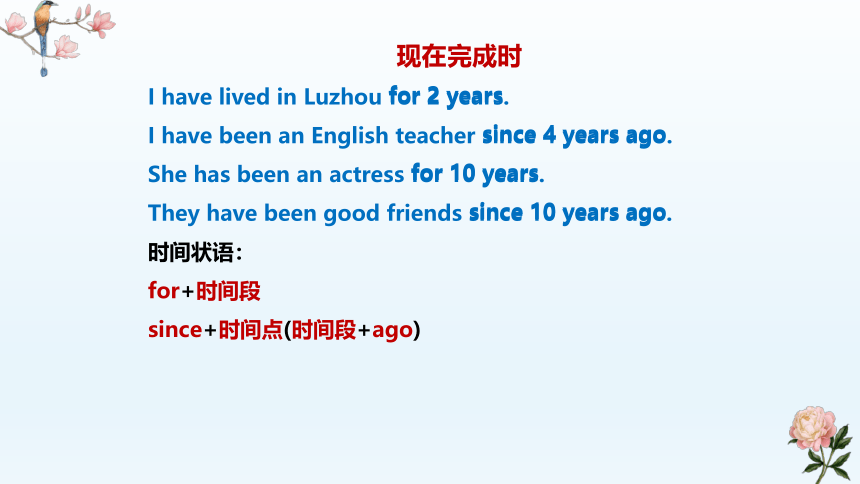
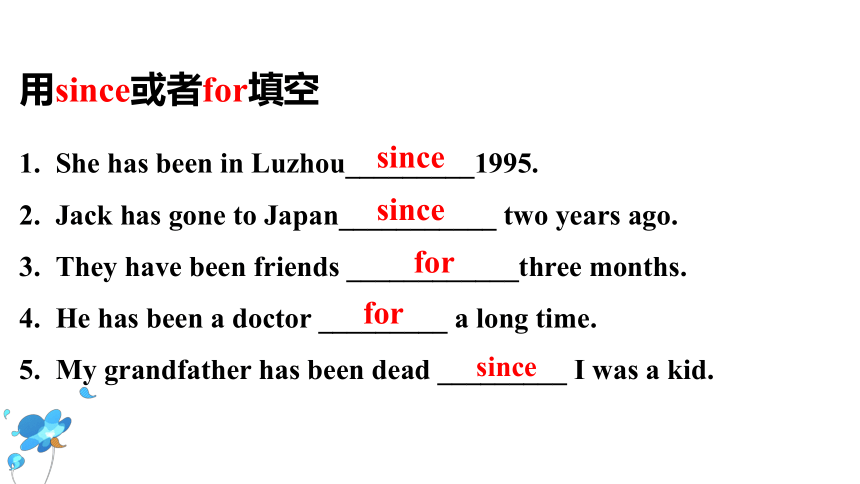
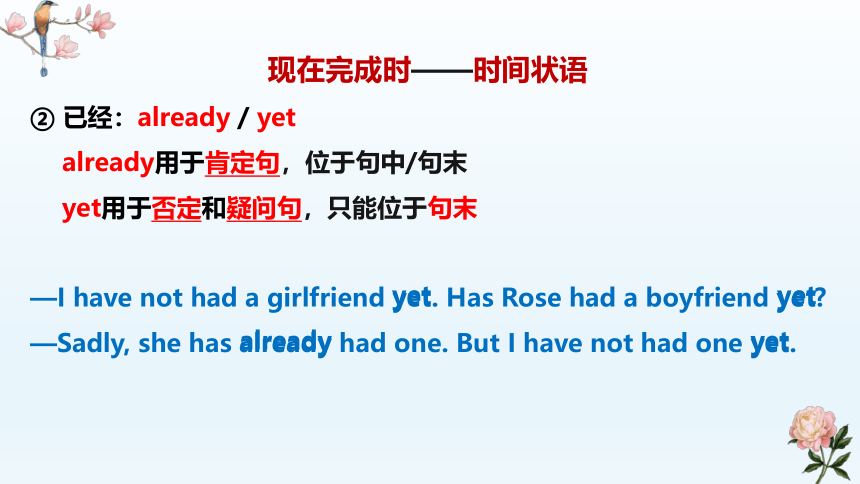
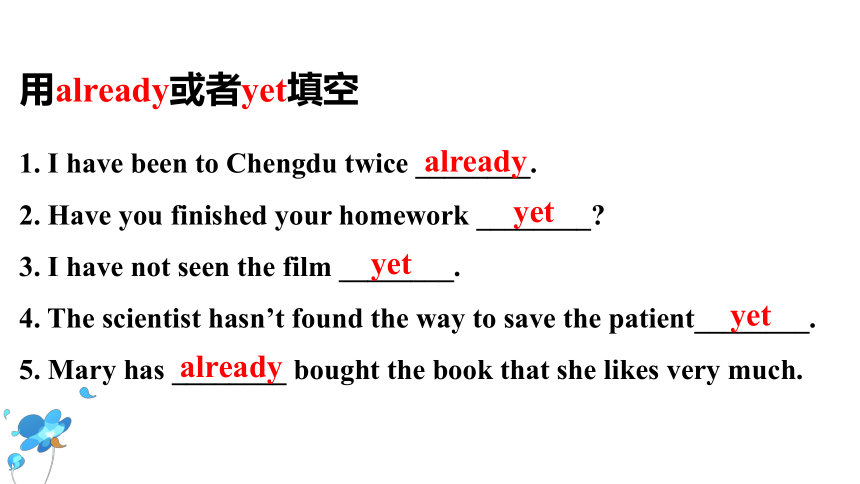
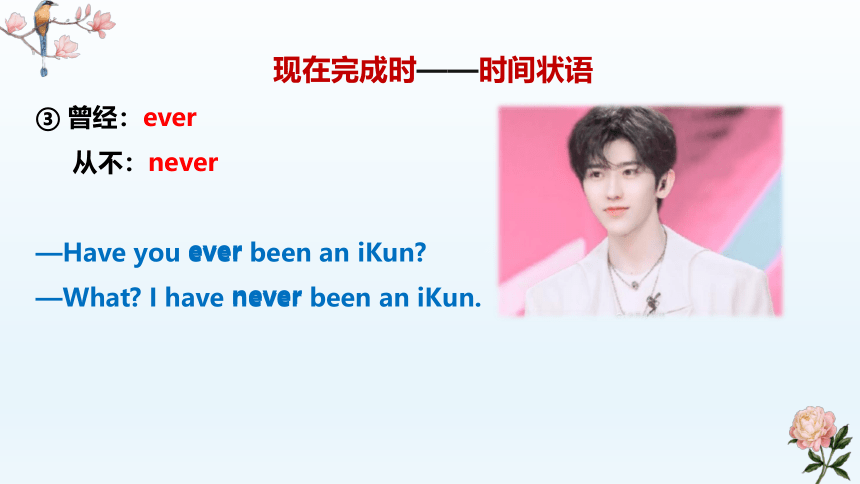
文档简介
(共26张PPT)
现在完成时
语法
过去发生的动作或状态一直持续到现在且可能继续持续下去
过去发生的动作对现在造成影响
for+时间段/since+时间点(时间段+ago)、in
the
past
few
years
already/yet、ever/never、just/before、so
far/up
to
now
have/has+过去分词(done)
肯定句:主语+have/has
done+其他
否定句:主语+have/has
not
done
+其他
疑问句:have/has提前
现在完成时
I
have
lived
in
Luzhou
for
2
years.
I
have
been
an
English
teacher
since
4
years
ago.
She
has
seen
it.
I
have
finished
it.
定义:
过去发生的动作或状态一直持续到现在且可能继续持续下去
过去发生的动作对现在造成影响
现在完成时
I
have
lived
in
Luzhou
for
2
years.
I
have
been
an
English
teacher
since
4
years
ago.
She
has
been
an
actress
for
10
years.
They
have
been
good
friends
since
10
years
ago.
时间状语:
for+时间段
since+时间点(时间段+ago)
for
2
years
since
4
years
ago
for
10
years
since
10
years
ago
She
has
been
in
Luzhou_________1995.
Jack
has
gone
to
Japan___________
two
years
ago.
They
have
been
friends
____________three
months.
He
has
been
a
doctor
_________
a
long
time.
My
grandfather
has
been
dead
_________
I
was
a
kid.
用since或者for填空
since
since
for
for
since
现在完成时——时间状语
②
已经:already
/
yet
already用于肯定句,位于句中/句末
yet用于否定和疑问句,只能位于句末
—I
have
not
had
a
girlfriend
yet.
Has
Rose
had
a
boyfriend
yet?
—Sadly,
she
has
already
had
one.
But
I
have
not
had
one
yet.
yet
yet
yet
already
1.
I
have
been
to
Chengdu
twice
________.
2.
Have
you
finished
your
homework
________?
3.
I
have
not
seen
the
film
________.
4.
The
scientist
hasn’t
found
the
way
to
save
the
patient________.
5.
Mary
has
________
bought
the
book
that
she
likes
very
much.
用already或者yet填空
already
yet
yet
yet
already
现在完成时——时间状语
曾经:ever
从不:never
—Have
you
ever
been
an
iKun?
—What?
I
have
never
been
an
iKun.
ever
never
现在完成时——时间状语
④
刚刚:just
以前:before
—I
have
just
received
a
love
letter.
—I
have
never
received
any
love
letters
before.
just
before
现在完成时——时间状语
⑤
到目前为止:so
far
/
up
to
now
About
1.6
million
people
in
America
have
had
the
NCP
so
far.
We
have
not
found
a
way
to
fight
the
virus
up
to
now.
so
far
up
to
now
现在完成时——时间状语
⑥
过去几年来:in
the
past
few
years
You
have
changed
a
lot
in
the
past
few
years.
in
the
past
在过去
→
一般过去时
in
the
past
few
years
现在完成时
I
have
lived
in
Luzhou
for
2
years.
I
have
been
an
English
teacher
since
4
years
ago.
She
has
been
an
actress
for
10
years.
They
have
been
good
friends
since
10
years
ago.
She
has
seen
it.
I
have
finished
it.
谓语形式:
have/has+过去分词(done)
过去分词变化规则:与过去式一致
have
lived
have
been
has
been
have
been
has
seen
have
finished
have/has是助动词
部分过去分词不规则变化
①
AAA型:
read-read-read
spread-spread-spread
cut-cut-cut
let-let-let
put-put-put
cost-cost-cost
hit-hit-hit
hurt-hurt-hurt
shut-shut-shut
过去分词不规则变化
②
ABA型:
come-came-come
become-became-become
run-ran-run
③
ABC型:
do—did—done
am/is/are—was/were—been
go—went—gone
…
其余不规则变化详见日校教材最后一页!
过去发生的动作或状态一直持续到现在且可能继续持续下去
过去发生的动作对现在造成影响
for+时间段/since+时间点(时间段+ago)、in
the
past
few
years
already/yet、ever/never、just/before、so
far/up
to
now
have/has+过去分词(done)
肯定句:主语+have/has
done+其他
否定句:主语+have/has
not
done
+其他
疑问句:have/has提前
现完重难考点1——
have/has
been
to
I
have
been
to
Beijing
twice
before.
My
English
teacher
has
ever
been
to
so
many
beautiful
countries.
I
have
never
been
to
anywhere
interesting.
have/has
gone
to
My
mother
has
gone
to
Yunnan.
She
is
going
to
be
back
in
two
weeks.
I
didn’t
find
Mary.
Maybe
she
has
gone
to
Chengdu.
gone
adj.
去世的
have/has
been
to…
和
have/has
gone
to…
去了某地
去过(已回)
去了(未回)
标志词:次数、ever、never、before
1.
Andy,
with
his
parents,
_______
to
Hong
Kong,
and
they
will
stay
there
for
a
week.
A.have
gone
B.has
gone
C.have
been
D.has
been
2.
—_______
you
ever
_______
to
the
Great
Wall?
—Yes,
three
times.
A.Has;
been
B.Have;
been
C.Have;
gone
D.Has;
gone
3.
—Tom
and
Amy
_______
the
cinema
to
watch
a
film.
—Oh,
that's
why
I
can't
find
them
now.
A.have
gone
to
B.have
been
to
C.has
gone
to
D.has
been
to
4.
—Have
you
ever
_______
an
amusement
park?
—Yes,
I
have.
I
_______
Fun
Times
Park
last
year.
A.been
to;
have
gone
to
B.gone
to;
have
been
to
C.gone
to;
went
to
D.been
to;
went
to
现完重难考点2——
解题关键:时间状语
现在完成时
和
一般过去时
的辨析
一般过去时
yesterday
系列
last
系列
…ago
this
morning
in+过去的年份/世纪
过去时间状语从句
just
now
刚刚
现在完成时
for
/
since
in
the
past
few
years
already
/
yet
ever
/
never
just
/
before
so
far
/
up
to
now
1.
-It’s
dangerous
to
swim
in
the
river.
Look
at
the
sign.
-oh!
I
_______notice
it.
A.
don’t
B.
haven’t
C.
didn’t
D.
doesn’t
2.
-______you
ever
______
to
Hong
Kong?
-Yes,
I
_______
there
last
year.
A.
have,
been;
have
been
B.
have,
gone;
have
been
C.
have
gone,
go;
went
D.
have,
been;
went
3.
-_______
have
you
been
in
Shanghai?
-I
_______there
since
three
years
ago.
A.
When;
have
gone
B.
How
long;
have
been
C.
How
long;
went
D.
When;
have
been
4.
-_______
did
you
get
to
Luzhou?
-I
_______here
three
years
ago.
A.
When;
have
been
B.
How
long;
have
been
C.
How
long;
got
D.
When;
got
现完重难考点3——
他死了。
He
died.
He
is
dead.
他已经死了。
He
has
died.
He
has
been
dead.
他死了3年了。
He
has
died
for
three
years.
He
has
died
since
three
years
ago.
He
has
been
dead
for
three
years/since
three
years
ago.
瞬间动词
和
延续性动词
的转化
die
v.
死亡
He
died.
dead
adj.
死去的
He
is
dead.
死亡:
died——been
dead
现完重难考点3——
我买了这块表。
I
bought
this
watch.
I
have
this
watch.
我已经买了这块表。
I
have
bought
this
watch.
I
have
had
this
watch.
我买了这块表两周了。
I
have
bought
this
watch
for
two
weeks.
I
have
bought
this
watch
since
two
weeks
ago.
I
have
had
this
watch
for
two
weeks/since
two
weeks
ago.
瞬间动词
和
延续性动词
的转化
buy
v.
购买
I
bought
it.
have
v.
拥有
I
have
it.
买:
bought——had
瞬间动词
done
died
bought
borrowed
left
begun/started
moved
arrived
延续性动词
done
been
dead
had
kept
been
away
(from)
been
on
lived
been
in
1.
The
movie
_______
for
5
minutes,
so
let's
see
another
one.
A.has
been
on
B.has
started
C.started
D.began
2.
He
speaks
Chinese
well
because
he
_______
China
for
9
years.
A.has
moved
to
B.have
moved
to
C.has
lived
in
D.have
lived
in
3.
The
famous
female
writer
_______
for
abut
a
month
so
far.
A.died
B.has
been
dead
C.has
died
D.is
dead
4.
-How
long
_______
your
brother
_______
this
camera?
-For
two
weeks.
A.have;
bought
B.have;
had
C.has;
had
D.has;
bought
5.
﹣Jenny,
when
did
you
move
here?
﹣I
_______
here
for
three
years.
A.lived
B.moved
C.have
moved
D.have
lived
6.
-Mom,
I
want
to
watch
The
legend
of
Miyue(芈月传)at
8
tonight.
-Oh,
dear,
it
_______
for
a
few
minutes.
Come
on!
A.has
begun
B.will
begin
C.has
been
on
D.will
be
on
7.
-The
boy
misses
his
parents
very
much.
-They
_______
the
hometown
for
two
years.
A.have
left
B.left
C.have
been
away
from
D.were
away
from
8.
–When
_______
the
girl
borrow
the
books
from
the
library.
-She
_______
them
about
one
week.
A.has;
has
borrowed
B.did;
has
borrowed
C.has;
has
kept
D.did;
has
kept
See
you!
现在完成时
语法
过去发生的动作或状态一直持续到现在且可能继续持续下去
过去发生的动作对现在造成影响
for+时间段/since+时间点(时间段+ago)、in
the
past
few
years
already/yet、ever/never、just/before、so
far/up
to
now
have/has+过去分词(done)
肯定句:主语+have/has
done+其他
否定句:主语+have/has
not
done
+其他
疑问句:have/has提前
现在完成时
I
have
lived
in
Luzhou
for
2
years.
I
have
been
an
English
teacher
since
4
years
ago.
She
has
seen
it.
I
have
finished
it.
定义:
过去发生的动作或状态一直持续到现在且可能继续持续下去
过去发生的动作对现在造成影响
现在完成时
I
have
lived
in
Luzhou
for
2
years.
I
have
been
an
English
teacher
since
4
years
ago.
She
has
been
an
actress
for
10
years.
They
have
been
good
friends
since
10
years
ago.
时间状语:
for+时间段
since+时间点(时间段+ago)
for
2
years
since
4
years
ago
for
10
years
since
10
years
ago
She
has
been
in
Luzhou_________1995.
Jack
has
gone
to
Japan___________
two
years
ago.
They
have
been
friends
____________three
months.
He
has
been
a
doctor
_________
a
long
time.
My
grandfather
has
been
dead
_________
I
was
a
kid.
用since或者for填空
since
since
for
for
since
现在完成时——时间状语
②
已经:already
/
yet
already用于肯定句,位于句中/句末
yet用于否定和疑问句,只能位于句末
—I
have
not
had
a
girlfriend
yet.
Has
Rose
had
a
boyfriend
yet?
—Sadly,
she
has
already
had
one.
But
I
have
not
had
one
yet.
yet
yet
yet
already
1.
I
have
been
to
Chengdu
twice
________.
2.
Have
you
finished
your
homework
________?
3.
I
have
not
seen
the
film
________.
4.
The
scientist
hasn’t
found
the
way
to
save
the
patient________.
5.
Mary
has
________
bought
the
book
that
she
likes
very
much.
用already或者yet填空
already
yet
yet
yet
already
现在完成时——时间状语
曾经:ever
从不:never
—Have
you
ever
been
an
iKun?
—What?
I
have
never
been
an
iKun.
ever
never
现在完成时——时间状语
④
刚刚:just
以前:before
—I
have
just
received
a
love
letter.
—I
have
never
received
any
love
letters
before.
just
before
现在完成时——时间状语
⑤
到目前为止:so
far
/
up
to
now
About
1.6
million
people
in
America
have
had
the
NCP
so
far.
We
have
not
found
a
way
to
fight
the
virus
up
to
now.
so
far
up
to
now
现在完成时——时间状语
⑥
过去几年来:in
the
past
few
years
You
have
changed
a
lot
in
the
past
few
years.
in
the
past
在过去
→
一般过去时
in
the
past
few
years
现在完成时
I
have
lived
in
Luzhou
for
2
years.
I
have
been
an
English
teacher
since
4
years
ago.
She
has
been
an
actress
for
10
years.
They
have
been
good
friends
since
10
years
ago.
She
has
seen
it.
I
have
finished
it.
谓语形式:
have/has+过去分词(done)
过去分词变化规则:与过去式一致
have
lived
have
been
has
been
have
been
has
seen
have
finished
have/has是助动词
部分过去分词不规则变化
①
AAA型:
read-read-read
spread-spread-spread
cut-cut-cut
let-let-let
put-put-put
cost-cost-cost
hit-hit-hit
hurt-hurt-hurt
shut-shut-shut
过去分词不规则变化
②
ABA型:
come-came-come
become-became-become
run-ran-run
③
ABC型:
do—did—done
am/is/are—was/were—been
go—went—gone
…
其余不规则变化详见日校教材最后一页!
过去发生的动作或状态一直持续到现在且可能继续持续下去
过去发生的动作对现在造成影响
for+时间段/since+时间点(时间段+ago)、in
the
past
few
years
already/yet、ever/never、just/before、so
far/up
to
now
have/has+过去分词(done)
肯定句:主语+have/has
done+其他
否定句:主语+have/has
not
done
+其他
疑问句:have/has提前
现完重难考点1——
have/has
been
to
I
have
been
to
Beijing
twice
before.
My
English
teacher
has
ever
been
to
so
many
beautiful
countries.
I
have
never
been
to
anywhere
interesting.
have/has
gone
to
My
mother
has
gone
to
Yunnan.
She
is
going
to
be
back
in
two
weeks.
I
didn’t
find
Mary.
Maybe
she
has
gone
to
Chengdu.
gone
adj.
去世的
have/has
been
to…
和
have/has
gone
to…
去了某地
去过(已回)
去了(未回)
标志词:次数、ever、never、before
1.
Andy,
with
his
parents,
_______
to
Hong
Kong,
and
they
will
stay
there
for
a
week.
A.have
gone
B.has
gone
C.have
been
D.has
been
2.
—_______
you
ever
_______
to
the
Great
Wall?
—Yes,
three
times.
A.Has;
been
B.Have;
been
C.Have;
gone
D.Has;
gone
3.
—Tom
and
Amy
_______
the
cinema
to
watch
a
film.
—Oh,
that's
why
I
can't
find
them
now.
A.have
gone
to
B.have
been
to
C.has
gone
to
D.has
been
to
4.
—Have
you
ever
_______
an
amusement
park?
—Yes,
I
have.
I
_______
Fun
Times
Park
last
year.
A.been
to;
have
gone
to
B.gone
to;
have
been
to
C.gone
to;
went
to
D.been
to;
went
to
现完重难考点2——
解题关键:时间状语
现在完成时
和
一般过去时
的辨析
一般过去时
yesterday
系列
last
系列
…ago
this
morning
in+过去的年份/世纪
过去时间状语从句
just
now
刚刚
现在完成时
for
/
since
in
the
past
few
years
already
/
yet
ever
/
never
just
/
before
so
far
/
up
to
now
1.
-It’s
dangerous
to
swim
in
the
river.
Look
at
the
sign.
-oh!
I
_______notice
it.
A.
don’t
B.
haven’t
C.
didn’t
D.
doesn’t
2.
-______you
ever
______
to
Hong
Kong?
-Yes,
I
_______
there
last
year.
A.
have,
been;
have
been
B.
have,
gone;
have
been
C.
have
gone,
go;
went
D.
have,
been;
went
3.
-_______
have
you
been
in
Shanghai?
-I
_______there
since
three
years
ago.
A.
When;
have
gone
B.
How
long;
have
been
C.
How
long;
went
D.
When;
have
been
4.
-_______
did
you
get
to
Luzhou?
-I
_______here
three
years
ago.
A.
When;
have
been
B.
How
long;
have
been
C.
How
long;
got
D.
When;
got
现完重难考点3——
他死了。
He
died.
He
is
dead.
他已经死了。
He
has
died.
He
has
been
dead.
他死了3年了。
He
has
died
for
three
years.
He
has
died
since
three
years
ago.
He
has
been
dead
for
three
years/since
three
years
ago.
瞬间动词
和
延续性动词
的转化
die
v.
死亡
He
died.
dead
adj.
死去的
He
is
dead.
死亡:
died——been
dead
现完重难考点3——
我买了这块表。
I
bought
this
watch.
I
have
this
watch.
我已经买了这块表。
I
have
bought
this
watch.
I
have
had
this
watch.
我买了这块表两周了。
I
have
bought
this
watch
for
two
weeks.
I
have
bought
this
watch
since
two
weeks
ago.
I
have
had
this
watch
for
two
weeks/since
two
weeks
ago.
瞬间动词
和
延续性动词
的转化
buy
v.
购买
I
bought
it.
have
v.
拥有
I
have
it.
买:
bought——had
瞬间动词
done
died
bought
borrowed
left
begun/started
moved
arrived
延续性动词
done
been
dead
had
kept
been
away
(from)
been
on
lived
been
in
1.
The
movie
_______
for
5
minutes,
so
let's
see
another
one.
A.has
been
on
B.has
started
C.started
D.began
2.
He
speaks
Chinese
well
because
he
_______
China
for
9
years.
A.has
moved
to
B.have
moved
to
C.has
lived
in
D.have
lived
in
3.
The
famous
female
writer
_______
for
abut
a
month
so
far.
A.died
B.has
been
dead
C.has
died
D.is
dead
4.
-How
long
_______
your
brother
_______
this
camera?
-For
two
weeks.
A.have;
bought
B.have;
had
C.has;
had
D.has;
bought
5.
﹣Jenny,
when
did
you
move
here?
﹣I
_______
here
for
three
years.
A.lived
B.moved
C.have
moved
D.have
lived
6.
-Mom,
I
want
to
watch
The
legend
of
Miyue(芈月传)at
8
tonight.
-Oh,
dear,
it
_______
for
a
few
minutes.
Come
on!
A.has
begun
B.will
begin
C.has
been
on
D.will
be
on
7.
-The
boy
misses
his
parents
very
much.
-They
_______
the
hometown
for
two
years.
A.have
left
B.left
C.have
been
away
from
D.were
away
from
8.
–When
_______
the
girl
borrow
the
books
from
the
library.
-She
_______
them
about
one
week.
A.has;
has
borrowed
B.did;
has
borrowed
C.has;
has
kept
D.did;
has
kept
See
you!
同课章节目录
- Unit 1 What's the matter?
- Section A
- Section B
- Unit 2 I'll help to clean up the city parks.
- Section A
- Section B
- Unit 3 Could you please clean your room?
- Section A
- Section B
- Unit 4 Why don't you talk to your parents?
- Section A
- Section B
- Unit 5 What were you doing when the rainstorm came
- Section A
- Section B
- Review of Units 1-5
- Unit 6 An old man tried to move the mountains.
- Section A
- Section B
- Unit 7 What's the highest mountain in the world?
- Section A
- Section B
- Unit 8 Have you read Treasure Island yet?
- Section A
- Section B
- Unit 9 Have you ever been to a museum?
- Section A
- Section B
- Unit 10 I've had this bike for three years.
- Section A
- Section B
